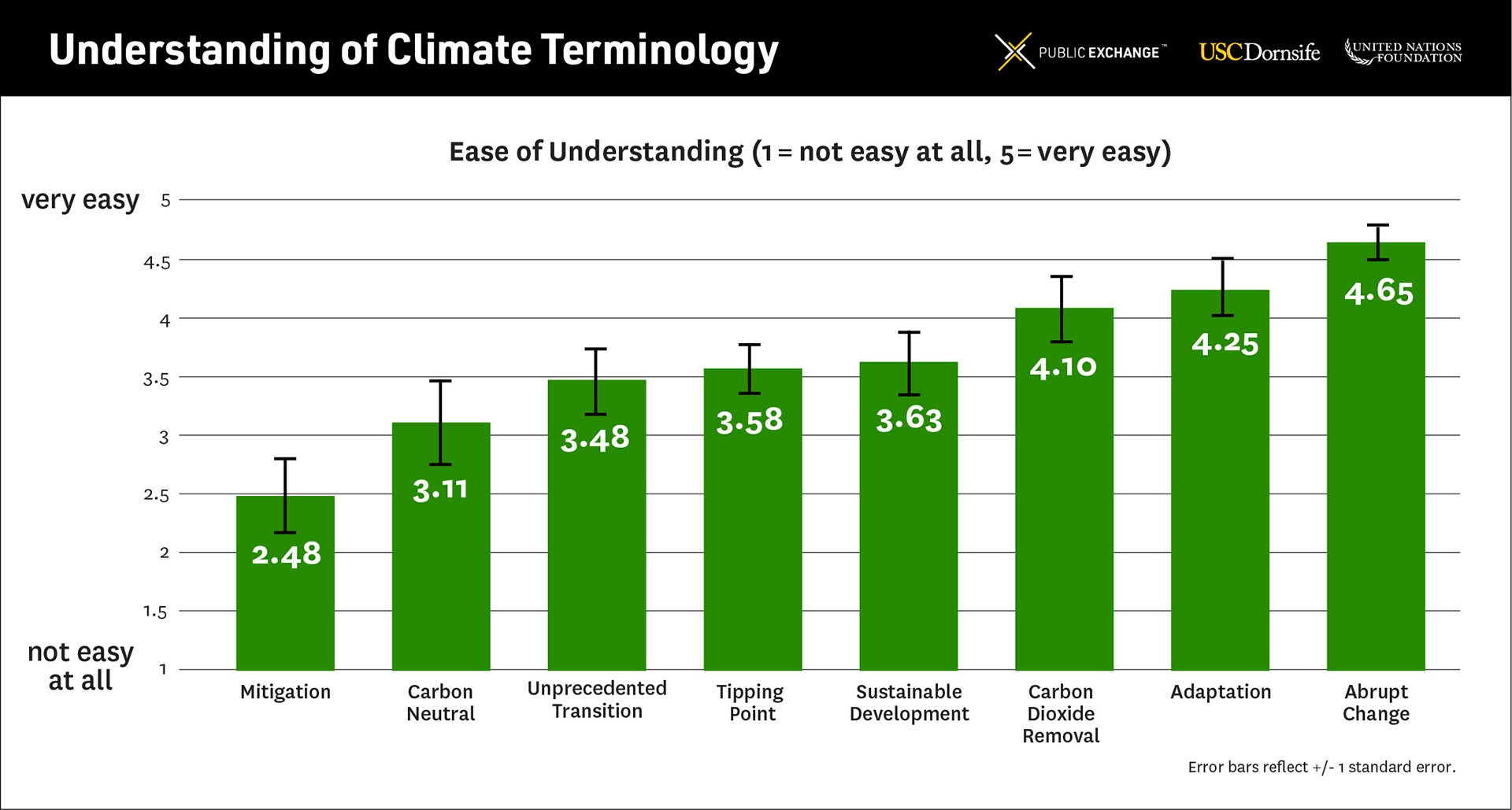
Climate change challenge: Terminology used by scientists confounds public
There’s plenty of information available about climate change. The question is whether it’s understandable.
A new study finds that U.S. residents struggle to understand terms frequently used by scientists to describe climate change. Study participants said some of the terms were too complex to understand. Other terms were misunderstood in the context of climate change. Participants suggested simpler, alternative language.
The study was published in a special edition of the journal Climatic Change titled Climate Change Communication and the IPCC.
“One survey respondent summed it up nicely when saying, ‘It sounds like you’re talking over people,’” said Wändi Bruine de Bruin, the study’s lead author and Provost Professor of Public Policy, Psychology, and Behavioral Sciences at USC Dornsife College of Letters, Arts and Sciences and USC Price School of Public Policy. “Scientists need to replace jargon with everyday language to be understood by a lay audience.”
The study was convened by the USC Dornsife Public Exchange and included a team of USC researchers as well as personnel from the United Nations Foundation.
“We have to get better at communicating the dire threat from climate change if we expect to build support for more forceful action to stop it,” said Pete Ogden, vice president for energy, climate and the environment at the UN Foundation. “We need to start by using language that anyone can understand.”
Study participants were asked to rate how easy or hard it was to understand eight terms drawn from publicly available reports written by the Intergovernmental Panel on Climate Change. (The documents used for the study did not include the IPCC’s latest report, which was released to the public on Aug. 9.) The UN Foundation chose the terms through informal consultation with the IPCC.
Study participants were asked to rate the difficulty of understanding eight terms on a scale of 1 (“not easy at all”) to 5 (“very easy”). (Graphic: Letty Avila.)
Coming to terms
The eight terms were “mitigation,” “carbon neutral,” “unprecedented transition,” “tipping point,” “sustainable development,” “carbon dioxide removal,” “adaptation” and “abrupt change.”
Participants said the word “mitigation” was the most difficult to understand. Mitigation, in the context of climate change, refers to actions to reduce the rate of climate change. More than half of the respondents referred to the word in the context of the law or insurance.
“To me, personally, it means mitigating costs, keeping costs low. … To prevent the expenditure of filing a lawsuit,” one respondent said. Mitigation was also commonly confused with mediation or “discussions with peers.”
The term “sustainable development” was in the middle of the pack. Among climate scientists, the term is used to describe economic growth that leaves a livable world for future generations. While participants generally said they understood the word “sustainable,” 65% of them interpreted “development” as referring to housing and infrastructure.
Participants said “abrupt change” was the easiest to understand. In the context of climate change, the term refers to a change that is so rapid and unexpected that humans have a hard time adapting to it. (There are more complex definitions, as well.)
Although participants had heard of “abrupt” and “change,” they were not necessarily aware of the terms being used together or their meaning in the climate context. Some defined it in terms of personal action, rather than broad changes to the environment. As one person put it: “… you can make an abrupt change to change what nature is already doing.”
Additionally, participants were surprised to learn that “abrupt change” in the climate context may occur over centuries.
Plainspoken ideas
Participants were also asked to provide suggestions for alternative language. In general, they advised using simpler terms and using them in the context of climate change.
For example, for the term “unprecedented transition”, which the IPCC defines as “rapid, far-reaching and unprecedented changes in all aspects of society,” participants suggested: “a change not seen before.”
For “tipping point,” which the IPCC defines as “an irreversible change in the climate system,” one respondent offered: “too late to fix anything.”
“In several cases, the respondents proposed simple, elegant alternatives to existing language,” Bruine de Bruin said. “It reminded us that, even though climate change may be a complex issue, there is no need to make it even more complex by using complicated words.”
Existing science communication literature also recommends simplifying language to increase comprehension by:
- Limiting sentences to 16 to 20 words and using words with no more than two syllables, whenever possible (Cutts 2013; Kadayat and Eika 2020; McLaughlin 1969);
- Writing for the public at the level of a reader who is 12 or 13 years old, equivalent to U.S. grade level 6 to 7 (Wong-Parodi et al. 2013).
Survey Design
Lila Rabinovich, a qualitative researcher from USC Dornsife’s Center for Economic and Social Research, posed the terms to 20 participants with a variety of backgrounds and views about climate change. The participants were drawn from USC Dornsife’s Understanding America Study for their varying views about climate change and diversity in terms of age, race, gender and education.
In a qualitative study such as this one, a sample of 20 is large enough to find terms that are likely to be misunderstood (Morgan et al. 2002). Indeed, 88% of the misunderstandings in this study were raised in the first 10 interviews. After 17 interviews, no new misunderstandings were raised. A follow-up survey would be needed to examine how often misunderstandings occur or who is most likely to experience them.
